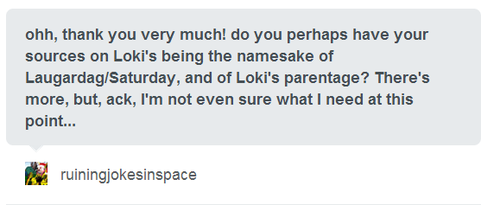#laugardag

Of course! I hope this is a good way to do it - I’m not very tumblr-savvy…

I’ve been meaning to start sourcing everything, but it will probably take a bit of time, since a lot of the information is just kind of my accumulated knowledge (I’ll do my best though!). About Loki’s life in Jotunheim specifically, let me see… I know the first time I read about it was in The Norse Myths by Helena Yvette Grimes, but that book is not really an academic one, and it’s very inaccurate in some parts. This website’s (http://shadowlight.gydja.com/loki.html) info on the subject is accurate and well-written, but this website is not academic either. Myths of the Norsemen by H.A. Guerber, an academic text, touches on Glut, Eisa, and Einmyria in chapter 22 (http://free.sbooks.net/H_A_Guerber/Myths_of_the_Norsemen/kindle.html), but not in exceptional detail. From a cursory sweep of my sources that I expected to have the right information, that is what I’ve found. Let me know if you want me to find more sources. I know there ARE more, but I’d have to reread a lot of material to locate the others. I definitely don’t mind doing this, since I should have been citing my sources from the beginning. Also, it’s always good to refresh knowledge. So just let me know if you’d like me to dig a little deeper. Thanks for bearing with me!

I’m so sorry for not responding sooner! The Laugardag/Saturday is also primarily from H.A. Guerber’s Myths of the Norsemen. Loki’s parentage is a bit trickier, because nearly every piece about Loki will mention Loki’s parentage, but they all say different things. It’s because no one is quite in agreement on Loki’s true origins. For that reason, what I’ve posted here might not even be the most accurate answer.
The H.A. Guerber text cites the three different possibilities of Loki’s parentage, in chapter 22 like the information on Eisa, Einmyria, and Glut. [1]One possibility is that Loki was among the family of original gods with Odin and Hoenir, since the three make up a common triad. There is also the possibility that Loki was:
“[2]the son of the great giant Fornjotnr (Ymir), his brothers being Kari (air) and Hler (water), and his sister Ran, the terrible goddess of the sea. Other mythologists, however, make him [3]the son of the giant Farbauti, who has been identified with Bergelmir, the sole survivor of the deluge, and of Laufeia (leafy isle) or Nal (vessel), his mother” (Guerber).
I’m sorry to keep suggesting the Guerber text, but many other mainstream texts are painfully inaccurate (with respect to older sources and artefacts) and suffer from some form of factual distortion. This is one of the few that doesn’t, so it’s a good source of information.
This (http://shadowlight.gydja.com/loki.html) well-informed/written but non-academic site that I’ve suggested before details Loki’s descent from Farbauti and Laufey.
I’m fairly certain that Rudolf Simek’s Dictionary of Norse Mythology provides a good explanation on Loki’s parentage, but I don’t know on which page it is.
Otherwise, you can always use more original sources, like Snorri’s Prose Edda Gylfaginning, in which it is explicitly stated that Farbauti and Laufey are Loki’s father and mother. It also describes their escape from the flood. The Prose Edda Skaldskaparmal calls Loki “son of Farbauti and Laufey”, “Farbauti’s son”, and “Farbauti’s sly son”.
I owe you a lot more sources than this, but I study this field for leisure only, so I haven’t kept very good record of my sources. I am currently going through all texts/research papers/articles/websites I have saved up, so that I can properly document everything on here (It may take a while though). Until then, I hope this will do!
Each day of the seven day week held a special significance to a god. Sunday was the day sacred to the Sun, Monday the Moon, Tuesday Tyr, Wednesday Odin, Thursday Thor, Friday Frigga, and Saturday Loki. The name of each day sounds fairly similar to its corresponding god, with the exception of Saturday, which is often mistakenly assumed to be named for the Roman god Saturn.
Saturday, the final day of the week, was originally known as Laugardag (formed from Loki’s name, but it translates to wash-day). When adapted to English, the day did in fact maintain its connection to Loki. The word Saturday is based on Sataere (the thief in ambush). This is simply another one of Loki’s names, used when referring to Loki as a god of agriculture (each of the gods presided over several different aspects of the universe, and Loki was no exception). So, although few know of it, the final day of the week is still named for Loki.
Incidentally, I’ve seen a lot of campaigns online prompting people to begin calling Saturday “Lokisday”. Most people have no idea Saturday is named after Loki, so Loki’s significance to the day is forgotten. This campaign to call Saturday Lokisday seeks to reinforce Loki’s connection to the day. This is an interesting idea, and I will definitely attempt to use Lokisday as often as I can remember.
